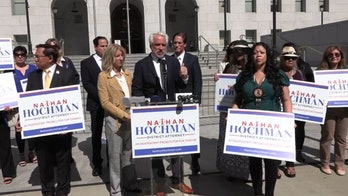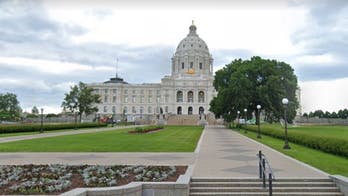Polling is open in 12 states around the country Tuesday as 10 states hold primaries, one holds a special election and another has a runoff for the Democratic Senate nomination in a race that demonstrates the anti-incumbent mood flaring in key contests.
The power of the Tea Party movement will be tested as voters chose party candidates who could upend the congressional balance of power.
Nowhere is that movement's influence more prominent Tuesday than in Nevada, where Tea Party-backed Sharron Angle has surged to the front of the pack of Republican candidates looking for the chance to take on Senate Majority Leader Harry Reid in the fall. Angle wants to abolish the federal income tax code and phase out the Social Security government pension for younger workers -- policies which Reid supporters depict as too extreme for most Nevadans.
Angle's opponents, businessman Danny Tarkanian and former state GOP Chairwoman Sue Lowden, said Tuesday that there's still time to turn the race around and disputed the level of support Angle claims.
Tarkanian told Fox News that he's gotten backing from key Tea Party groups as well.
"I feel very strongly that I'm going to get the majority of those voters," he said. "I know that a lot of people still haven't decided who they support."
Lowden said most Republican primary voters will not vote and so the candidates are scrambling for the support of a relatively small group of people.
"We're just cranking it out at the last minute today," she told Fox News.
With unemployment still near 10 percent, the national budget deficit at record levels and a majority of Americans in a negative mood about the direction of the country, congressional incumbents are in particular disfavor.
Historically, the party that controls the White House takes a beating in the elections that fall in the middle of a president's first term, and Democrat Barack Obama is two years into his four-year term. However, neither party appears safe from voters' ire. A Pew Research Center poll in April found that public confidence in government was at one of the lowest points in a half century. And earlier primaries indicated that voters are willing to oust Washington incumbents -- regardless of party.
The primaries will determine matchups for November, when Democrats will try to maintain their comfortable majorities in the House and Senate and overcome Republican challenges in dozens of gubernatorial races.
The anti-incumbent mood has put Reid and liberal stalwart Sen. Barbara Boxer of California on notice that they'll face tough re-election fights regardless of who the Republicans nominate.
In California, former Hewlett Packard Co. chief executive Carly Fiorina, who has former Alaska Gov. Sarah Palin's support, was leading the three-candidate field for the chance to challenge Boxer.
In Arkansas, two-term Democratic Sen. Blanche Lincoln could become the third incumbent senator ousted in the primary season. Republican Sen. Bob Bennett of Utah and Republican-turned-Democrat Sen. Arlen Specter of Pennsylvania already have lost their re-election bids.
The centrist Lincoln is in a runoff against Arkansas Lt. Gov. Bill Halter, who is being supported by labor unions and liberal groups that have spent millions to try to unseat the White House-backed senator. They were forced into a runoff for the party nomination after neither captured 50 percent of the vote in the May 18 primary.
California's Republican primary also will pick candidates to succeed term-limited Gov. Arnold Schwarzenegger. Republican billionaire Meg Whitman, a former eBay chief executive who has spent more than $80 million of her own fortune, faced state insurance commissioner Steve Poizner, a wealthy former businessman who has spent around $25 million. Attorney General Jerry Brown, a former governor, is the likely Democratic nominee.
Voters were choosing Democratic and Republican nominees for governor in several other states like Iowa, where the general election contest was certain to be competitive. Republican primary voters in South Carolina were settling a nasty four-way gubernatorial primary contest.
Three Iowa Republicans are battling for the right to oppose Democrat Chet Culver, considered one of the nation's most vulnerable governors.
Six-term South Carolina Republican Rep. Bob Inglis was trying to fend off primary challengers who have made the race a referendum on his 2008 vote to bail out the nation's banking industry.
Republicans appear ready to oust Nevada Gov. Jim Gibbons after his messy divorce. Former federal judge Brian Sandoval is favored for the Republican nomination.
Elsewhere, South Carolina Republicans were choosing a successor for the term-limited and scandal-scarred Republican Gov. Mark Sanford, and the victor likely will become governor of the heavily Republican state.
State Rep. Nikki Haley had the advantage in the final days. She is trying to become the state's first female governor and overcome allegations of infidelity, which she denies. She has also been the target of racial slurs because her parents are Sikhs who emigrated from India.
Voters also are choosing party candidates in Georgia. Maine, Montana, New Jersey, North Dakota, South Dakota and Virginia.
The Associated Press contributed to this report.




